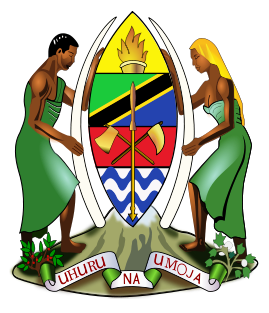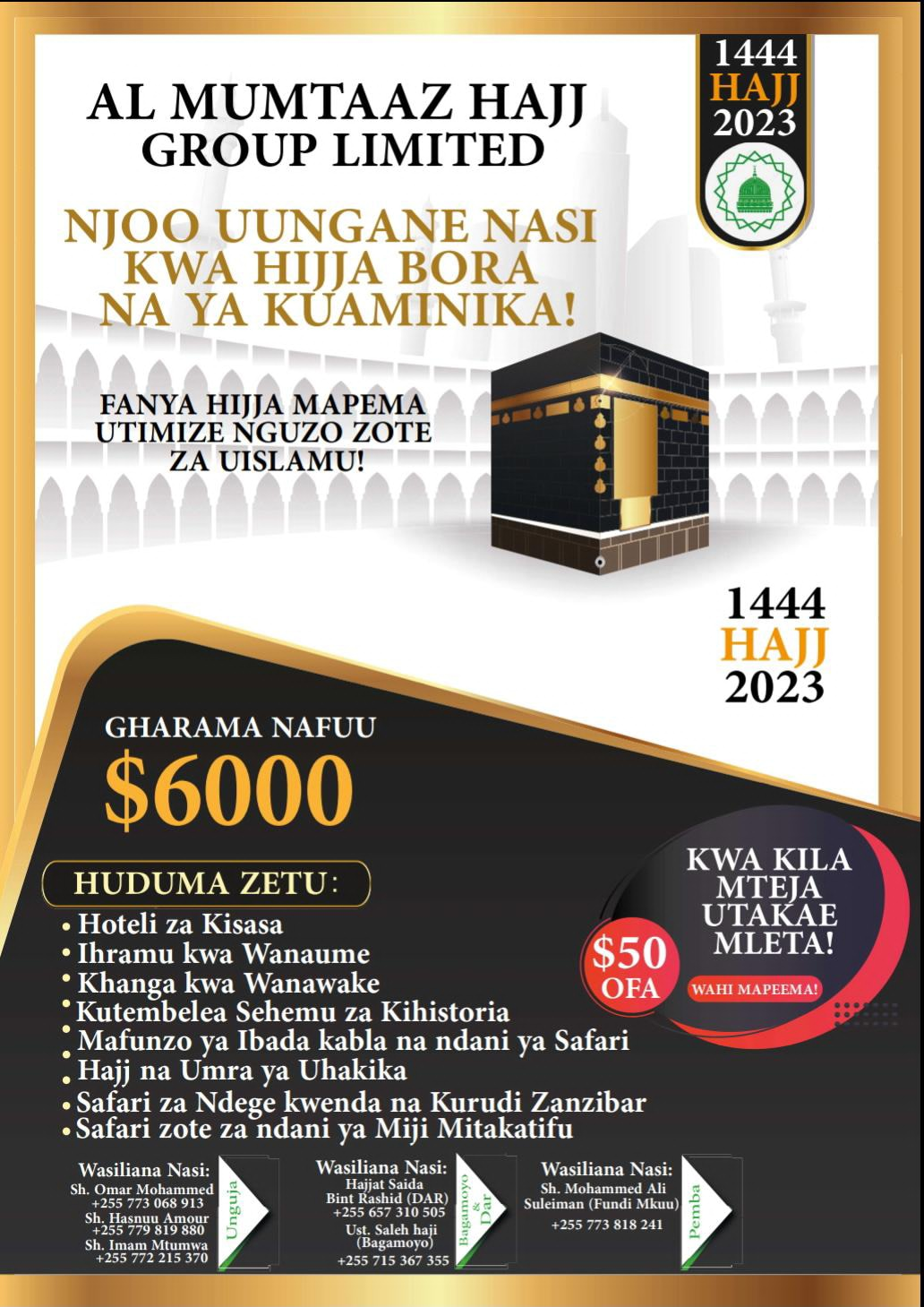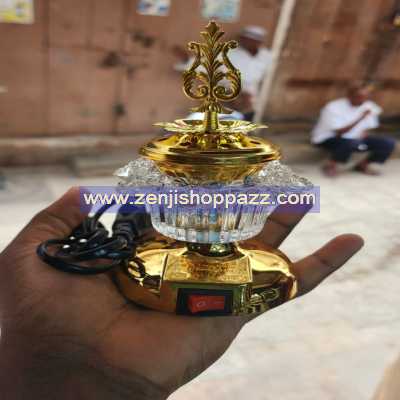Nafasi za Kazi (DDCA, DAWASA, OSHA, NCT na TICD
General Description

THE UNITED REPUBLIC OF TANZANIA

PRESIDENT’S OFFICE
PUBLIC SERVICE RECRUITMENT SECRETARIAT
Ref.No.EA.7/96/01/J/72 12nd December, 2017
VACANCIES ANNOUNCEMENT
President’s Office, Public Service Recruitment Secretariat on behalf of the Drilling and Dam Construction Agency (DDCA), Dar es Salaam Water and Sewerage Authority (DAWASA), Occupational Safety and Health Authority (OSHA), National College of Tourism (NCT) and Tengeru Institute of Community Development (TICD) invites qualified Tanzanians to fill (14) vacant posts as mentioned below;
1.0 INTRODUCTION
1.1 DRILLING AND DAM CONSTRUCTION AGENCY (DDCA).
Drilling and Dam Construction Agency (DDCA) is a Government Executive Agency established in accordance with Executive Agencies Act.No.30 0f 1997 and was launched on the 26th of March 1999 under Ministry of Water. The core mandate of DDCA is to develop sustainable water sources through efficient means at a cost effective manner.
1.1.1 CHIEF EXECUTIVE OFFICER (CEO)- RE - ADVERTISED 1.1.2 DUTIES AND RESPONSIBILITIES
i. Shall be the head of the Executive Agency; DDCA
ii. Shall be Responsible for the day to day operations of the Agency, the proper management of its funds, property, business, personnel management, Organization control and Discipline.
iii. Develop and implement sustainable business opportunities in all operating units of the Agency
iv. Identify, develop and negotiate business opportunities with potential clients locally and Internationally
v. Management and financial control of the Agency
vi. Develop appropriate revenue plans and setting revenue targets
vii. Managing the Agency’s commercial activities to ensure maximum productivity and efficiency
viii. Abide to the annual performance agreement concluded between him and the
Permanent Secretary ix. Shall be the Secretary of Executive Agency’s Advisory Board
1.1.3 QUALIFICATION AND EXPERIENCE
A holder of Master’s degree in Water Resource Engineering/Civil Engineering/ Geology/Geophysics Hydrogeology or any other related field. Must be registered with
Engineers Registration Board (ERB), with at least seven (7) years’ experience of which five (5) years in a Senior Management position and must be computer literate.
2.0 INTRODUCTION 2.1 DAR ES SALAAM WATER AND SEWERAGE AUTHORITY (DAWASA)
In 1981 the Government of Tanzania established the National Urban Water Authority and charged it with the responsibility to develop and manage urban water supply on the mainland of Tanzania. NUWA which became operational in 1984 set a target to take over and reform water supply services in all urban areas in Dar es Salaam.
The Government reorganised NUWA in 1997 to form the Dar es Salaam Water and Sewerage Authority by merging the functions of NUWA and the sewerage functions of the Sewerage and Sanitation Department of the City Commission. Under the DAWASA Act DAWASA was made responsible for developing operating and maintaining all water supply and sewerage services in Dar es Salaam and its satellite towns of Bagamoyo andKibaha..
The DAWASA area of operations incorporates the Cities of Dar Es Salaam, Kibaha,
Bagamoyo and the corridors of its two transmission lines. The Dar es Salaam Water Supply and Sewerage Authority is responsible for providing water supply services to its customers (about 100 000) in its area of operations. DAWASA also provides sewerage services to a small number of customers (around 20, 000) in the City of Dar Es Salaam. By the late 1990s it was evident that DAWASA was unable to respond quickly enough to meet customer demands for improved levels of service and improve finances to adequately maintain and replace its aging assets.
In August 1997 AfDB identified a Dar es Salaam Water Supply and Sanitation Project that would focus on rehabilitating and improving operations and facilities with DAWASA as the service provider and Operator. AfDB put project processing on hold pending the outcome of consultations in 1997 / 98 between Operators and the GoT for a long term “Concession”. Under the proposed arrangements the concessionaire was to be responsible for financing the investment program estimated to cost of about US%24250 million as well as operation and maintenance activities.
In November 1998 it became clear that this approach was not going to succeed. Private investors were unwilling to finance such a venture in Dar es Salaam given the state of the WSS operations and infrastructure. Consequently GoT requested World Bank assistance to design an option that would combine private operation and public financing. In March 2003 DAWASA completed the preparation of the Dar es Salaam Water Supply & Sanitation Project (DWSSP) in keeping with the suggested scope defined by the World Bank. The World Bank African Development Bank and the European Investment Bank appraised the project and commenced negotiations for financing.
DAWASA and CWS met all conditions precedent for external financing and the project and lease contracts became effective 1 August 2003. The Lease Contract with City Water Services was terminated on 31st May 2005 after attempts to renegotiate the contract failed. Upon termination of the CWS Lease Contract DAWASA appointed the Dar es Salaam Water and Sewerage Corporation (DAWASCO) as the new Operator for the DAWASA Service Area. DAWASCO was established in May 2005 under the Public Corporations Act 1992. Following negotiations DAWASA and DAWASCO signed a new ten year Lease Contract effective 1 July 2005.
2.1.1 CHIEF EXECUTIVE OFFICER
2.1.2 Appointment by: The Minister Responsible for Water
2.1.3 Reports to: Board of Directors
2.1.4 Supervises: Directors and Heads of Units
DAWASA is charged with the responsibility of ensuring availability of safe and clean water and environmentally friendly disposal of wastewater. Under the direction of the Board of Directors, CEO is responsible for day-to-day functioning of DAWASA. The CEO ensures that the Authority’s mission is realized and meets its objectives by effectively carrying out the Authority’s mandate according to DAWASA Act.
2.1.5 DUTIES AND RESPONSIBILITIES
i. Accounting Officer of DAWASA responsible for directing and supervising the
Authority’s strategic developmental and operational plans; ii. Formulate and recommend objectives, strategies and policies of the Authority and ensure their implementation;
iii. Review actual performance against plans and budgets and submits reports to the Board detailing performance with recommendations for actions necessary to correct adverse variances;
iv. Develop and maintain ethical standards and establishes management controls and appropriate monitoring systems;
v. Delegate authority appropriately in-order to meet DAWASA’s objectives;
vi. Ensure DAWASA has competent and adequate staff necessary for the proper and efficient conduct of the business and activities of DAWASA;
vii. Mobilize resources for capital investments;
viii. Take remedial action to correct adverse variations and exploits favourable variations to the set plans and ethical standards.
ix. Ensure that DAWASA’s activities are environmentally friendly and conform to the rules;
x. Establish and maintain effective communication within the Authority.
xi. Make recommendations to the Board for fixing of water and sewerage tariffs and collects revenue thereof;
xii. Ensure sustainable supply of clean and quality water for bulk and retail customers as well as efficient management of waste water;
xiii. Build an effective management team and develop productivity culture and results oriented management; and
xiv. Perform any other related and legally acceptable duties as may be assigned by the Board of Directors and MoWI.
2.1.6 QUALIFICATION AND EXPERIENCE
i. Bachelor Degree in Civil Engineering, Bachelor Degree in Mechanical Engineering, Water Resource Management, Environmental or Sanitation
Engineering;
ii. Shall have A Master’s degree in the above field s or MBA iii. Must be registered as professional by respective Boards and is required to have strong conceptual and strategic ability, and extensive managerial, administrative and supervisory experience of at least 10 years’ experience in Water and Sanitation Sector, five of which in at least managerial position from a reputable organization and must be ICT literate.
iv. Computer literate is essential.
2.1.7 REMUNERATION
Salary Scale: DAWASA Pay Grade 1.
2.1.8 TERMS OF ENGAGEMENT
Five years contract, renewable on satisfactory service and performance.
3.0 OCCUPATIONAL SAFETY AND HEALTH AUTHORITY (OSHA)
Occupational Safety and Health Authority (OSHA) is a Government Executive Agency established under the Executive Agencies act No. 30 of 1997. Its main function is to promote a good, sound and a health working environment by enforcing the occupational Safety and Health Act. No. 5 of 2003 through inspection of work places to detect hazards which can affect the health of workers, conducting medical examination to workers, providing education and conducting training in Occupational Safety and Health. The ultimate goal is to have health workers at a healthy work environment so as to increase productivity.
In order to achieve the compact objectives OSHA now seek applications from suitably qualified Tanzanian who are self motivated, hardworking, honest and committed to their work to fill the following positions:-
3.1.1 MEDICAL OFFICER II (1 POST) 3.1.2 DUTIES AND RESPONSIBILITIES
i. Take part in specific Occupational health programmes for both workers and management
ii. Provide input for occupational health surveys and researches e.g by preparing articles on OHS
iii. Prepare monthly and annual reports
iv. Provide inputs for Business plan, strategic plan on Occupational medicine issues.
v. Keep records of Inspections
vi. Conduct follow up inspections to ensure corrective measures have been implemented.
vii. Conduct risk assessments and general inspections at workplaces and identify work conditions that contribute to the overall ill health of workers and suggest improvement measure by finding root cause.
viii. Carry out health examinations and health surveillance of workers to establish and maintain database on health status of workers in different workplace settings for use in occupational health management.
ix. Attend meetings/seminars/symposia on occupational medicine
x. Provide input to Public Relations Office on occupational medicine issues to be delivered to media, Government agencies, workers and management
xi. Interpret scientific data collected during investigations and recommend appropriate control methods
xii. Provide effective measures to protect those who are vulnerable such as disabled persons and pregnant at workplace
xiii. Ensure compliance with set standards and guideline in occupational health services at workplace.
xiv. Review documents from stakeholders
xv. Review existing and current Occupational safety and health literature
xvi. Prepare citations, propose penalties, and determine abetment schedule for
identified violations
xvii. Participate in assessment of workers disability as a result of occupational illness and injuries for the purpose of worker compensation and or rehabilitate programmes.
xviii. Performing any other related duties as may be assigned by the Head (Occupational Medicine)
3.1.3 QUALIFICATION AND EXPERIENCE
Bachelor Degree in Medicine or equivalent qualification from a recognized Institution
3.1.4 REMUNERATION
Attractive remuneration package in accordance with the OSHA salary SCALE 7.1
3.1.5 NURSING OFFICER II (1 POST) 3.1.6 DUTIES AND RESPONSIBILITIES
i. Take part in specific Occupational health programmes for both workers and management
ii. Provide input for occupational health surveys and researches e.g by preparing articles on OHS
iii. Prepare monthly and annual reports
iv. Provide inputs for Business plan, strategic plan on Occupational medicine issues.
v. Keep records of Inspections
vi. Conduct follow up inspections to ensure corrective measures have been implemented.
vii. Conduct risk assessments and general inspections at workplaces and identify work conditions that contribute to the overall ill health of workers and suggest improvement measure by finding root cause.
viii. Carry out health examinations and health surveillance of workers to establish and maintain database on health status of workers in different workplace settings for use in occupational health management.
ix. Attend meetings/seminars/symposia on occupational medicine
x. Provide input to Public Relations Office on occupational medicine issues to be delivered to media, Government agencies, workers and management
xi. Interpret scientific data collected during investigations and recommend appropriate control methods
xii. Provide effective measures to protect those who are vulnerable such as disabled persons and pregnant at workplace
xiii. Ensure compliance with set standards and guideline in occupational health services at workplace.
xiv. Review documents from stakeholders
xv. Review existing and current Occupational safety and health literature
xvi. Prepare citations, propose penalties, and determine abetment schedule for identified violations
xvii. Participate in assessment of workers disability as a result of occupational illness and injuries for the purpose of worker compensation and or rehabilitate programmes. xviii. Performing any other related duties as may be assigned by the Head (Occupational Medicine)
3.1.7 QUALIFICATION AND EXPERIENCE
Bachelor Degree in Nursing or equivalent qualification from a recognized Institution
3.1.8 REMUNERATION
Attractive remuneration package in accordance with the OSHA salary SCALE 6.1
3.1.9 INDUSTRIAL HYGIENE INSPECTOR II (2 POST) 3.1.10 DUTIES AND RESPONSIBILITIES
i. Carry out general work place inspections
ii. Carry out work environment measurements (heat/cold stress, noise, light, dust, gases, fumes, aerosol, mist, vapour, radiation, indoor air quality, ventilation, efficiency etc.)
iii. Prepare monthly and annual reports
iv. Conduct environmental control trainings to workers and management at workplaces.
v. Operate and maintain work environment measuring equipment
vi. Provide input for and environmental control surveys and researches
vii. Provide inputs for Business plan, Strategic plan, Occupational safety and health issues
viii. Prepare articles on and environmental control
ix. Recognize, evaluate and control workplace hazards
x. Attend meetings/seminars/symposia on and environmental control
xi. Provide input to Public Relations Office on and environmental control issues to be delivered to media, Government agencies, workers and management
xii. Interpret scientific data collected during investigations and recommend appropriate control methods
xiii. Operate technical equipment for obtaining samples
xiv. Conduct follow up inspections to ensure corrective measures have been implemented
xv. Review documents from stakeholders
xvi. Review existing and current Occupational safety and health literature
xvii. Prepare citations, propose penalties, and determine abetment schedule for identified violations
xviii. Performing any other related duties as may be assigned by the Head (Industrial Hygiene)
3.1.11 QUALIFICATION AND EXPERIENCE
Bachelor Degree in Environmental Health Sciences or equivalent qualification from a recognized Institution
3.1.12 REMUNERATION
Attractive remuneration package in accordance with the OSHA salary SCALE 6.1
3.1.13 PLANT INSPECTOR II (1 POST) 3.1.14 DUTIES AND RESPONSIBILITIES
i. Carry out work place inspections
ii. Conduct plant safety risk assessment
iii. Prepare monthly and annual reports
iv. Planning and implementing specific plant and safety programmes for both workers and management
v. Keep records of Inspections
vi. Providing plant safety consultancy services
vii. Carry out accidents investigations and recommend control measures
viii. Provide input for plant surveys and researches
ix. Provide inputs for Business plan, Strategic plan, ergonomics issues
x. Prepare articles on ergonomics
xi. Attend meetings/seminars/symposia on ergonomics
xii. Provide input to Public Relations Office on plant safety issues to be delivered to media, Government agencies, workers and management
xiii. Interpret scientific data collected during investigations and recommend appropriate control methods
xiv. Conduct follow up inspections to ensure corrective measures have been implemented
xv. Scrutinize and approve drawings and plans for plants xvi. Review documents from stakeholders
xvii. Carry out annual plant safety compliance
xviii. Recognize, evaluate and control workplace mechanical hazards
xix. Review existing and current Occupational safety and health literature xx. Collect and prepare appropriate documentation of data and information for the scope of investigation, findings, conclusions and recommendations
xxi. Prepare citations, propose penalties, and determine abetment schedule for identified violations
xxii. Participate in the court proceedings on ergonomics matters
xxiii. Performing any other related duties as may be assigned by the Head (Plant safety)
3.1.15 QUALIFICATION AND EXPERIENCE
• Bachelor Degree in Mechanical Engineering or related qualification from a recognized Institution
• The candidate must be registered with the Engineers Registration Board of
Tanzania (ERB) as a Professional Engineer in the above mentioned fields
3.1.16 REMUNERATION
Attractive remuneration package in accordance with the OSHA salary SCALE 6.1
3.1.17 DRIVER II (1 POST) 3.1.18 DUTIES AND RESPONSIBILITIES
i. Drive all types of Motor Vehicles
ii. Drive properly any type of vehicle assigned to him/her
iii. Attend minor mechanical faults
iv. Undertaking routine checks on the vehicle to ensure that it is serviced
v. Sending the vehicle for service when due and advise on fuel consumption rates
vi. Ensure that vehicles are in good running condition at all times
vii. Use the vehicle only on assigned duties and to keep time when on duty
viii. Certify that the maintenance carried out on the vehicle are of adequate standards
ix. Report promptly any detected fault or defect on the motor vehicle
x. Inspect a vehicle before and after journey to verify their roadworthiness
xi. Maintain vehicle log book accurately and timely recorded
xii. Ensure that the vehicle is always having a valid insurance cover
xiii. Ensure that the vehicle assigned is always clean, in good running condition and is parked in a safe place
xiv. Perform any other duties as directed by the Head of Administration and
Human Resources
3.1.19 QUALIFICATION AND EXPERIENCE
i. Holder of “O” level Secondary Education with clean Driving License and Trade
Test at least Grade II ii. A minimum of three (3) years post qualification experience; and
iii. VIP Drivers Certificate will be an added advantage.
3.1.20 REMUNERATION
Attractive remuneration package in accordance with the OSHA salary SCALE 2.1
4.0 INTRODUCTION 4.1 NATIONAL COLLEGE OF TOURISM (NCT)
National College of Tourism (NCT) was launched as an Executive Agency under the Ministry of Natural Resources and Tourism on January 24th, 2003 in accordance with the Executive Agency Act No. 30 of 1997. NCT is responsible for providing high quality training in Hospitality and Tourism industry with a view of improving service standards and enhance skills in Tourism and Hospitality.
Therefore, NCT is looking for open minded, creative and competent qualified candidates to work in a dynamic organisation. The College invites applications for the following posts;
4.1.1 TUTOR GRADE II - HOUSE KEEPING AND LAUNDRY – 2 POSTS 4.1.2 REPORTS TO: Head of Department 4.1.3 DUTY STATION: Arusha and Bustani Campuses 4.1.4 DUTIES AND RESPONSIBILITIES
i. Teaches up to NTA level 6 and may assist teaching in higher NTA levels; ii. Administers examinations for NTA level 6 students;
iii. Conducts and supports research and consultancy works;
iv. Prepares learning resources;
v. Supervises field training;
vi. Supervises and assists junior staff; and
vii. Performs any other duties as assigned by supervisor.
4.1.5 QUALIFICATION AND EXPERIENCE
Bachelor Degree in Hotel Management with specialization in House Keeping and Laundry or equivalent qualifications from a reputable institution. Diploma in Education and three years working experience in teaching will be an added advantage.
4.1.6 POSITION: Tutor Grade II (Front Office Operations – 1 post) 4.1.7 REPORTS TO: Head of Department 4.1.8 DUTY STATION: Arusha Campus 4.1.9 DUTIES AND RESPONSIBILITIES
i. Teaches up to NTA level 6 and may assist teaching in higher NTA levels;
ii. Administers examinations for NTA level 6 students;
iii. Conducts and supports research and consultancy works;
iv. Prepares learning resources;
v. Supervises field training;
vi. Supervises and assists junior staff; and
vii. Performs any other duties as assigned by supervisor.
4.1.10 QUALIFICATION AND EXPERIENCE
Bachelor Degree in Hotel Management with specialization in Front Office Operations or equivalent qualifications from a reputable institution. Diploma in Education and three years working experience in teaching will be an added advantage.
4.1.11 TUTOR GRADE II (Food and Beverage Services – 2 posts) 4.1.12 REPORTS TO: Head of Department 4.1.13 DUTY STATION: Arusha Campus 4.1.14 DUTIES AND RESPONSIBILITIES
i. Teaches up to NTA level 6 and may assist teaching in higher NTA levels;
ii. Administers examinations for NTA level 6 students;
iii. Conducts and supports research and consultancy works;
iv. Prepares learning resources;
v. Supervises field training;
vi. Supervises and assists junior staff; and
vii. Performs any other duties as assigned by supervisor.
4.1.15 QUALIFICATION AND EXPERIENCE
Bachelor Degree in Hotel Management with specialization in Food and Beverage Services or equivalent qualifications from a reputable institution. Diploma in Education and three years working experience in teaching will be an added advantage.
4.1.16 TUTOR GRADE II (Pastry and Bakery – 1 post) 4.1.17 REPORTS TO: Head of Department 4.1.18 DUTY STATION: Arusha Campus 4.1.19 DUTIES AND RESPONSIBILITIES
i. Teaches up to NTA level 6 and may assist teaching in higher NTA levels;
ii. Administers examinations for NTA level 6 students;
iii. Conducts and supports research and consultancy works;
iv. Prepares learning resources;
v. Supervises field training;
vi. Supervises and assists junior staff; and
vii. Performs any other duties as assigned by supervisor.
4.1.20 QUALIFICATION AND EXPERIENCE
Bachelor Degree in Hotel Management with specialization in Pastry and Bakery Services or equivalent qualifications from a reputable institution. Diploma in Education and three years working experience in teaching will be an added advantage.
5.0 INTRODUCTION 5.1 TENGERU INSTITUTE OF COMMUNITY DEVELOPMENT (TICD)
The Tengeru Institute of Community Development (TICD) is a result of upgrading the former Community Development Training Institute (CDTI - Tengeru) into a full-fledged Institute. The Tengeru Institute of Community Development (TICD) was established by the Tengeru Institute of community Development (Establishment) Order 2013 as a body corporate. The Institute was established to serve as a practical-oriented professional centre for demand-driven training, research, advisory and consultancy services in the fields of Community Development, Gender and Development and Participatory Project Planning.
Since its inception in 1963, the Institute was administered by the Ministry responsible for Community Development, Gender and Children (Currently The Ministry of Health, Community Development, Gender, Elderly, and Children). However, beginning the year 2010 the Institute began a process of being an autonomous technical institution. The process was completed and the Institute was autonomous through parliamentary resolutions that culminated into endorsing and official operationalization of TICD (establishment) order, 2013. The Institute is now operating as an autonomous technical institution with an independent legal recognition.
The initial stages of the Institute’s operations in 1960’s was focused to offer orientation programmes to extension staff to have skills necessary for catalyzing communities’ actions. Simultaneously, the Institute started to offer more formal training for the award of Certificate in community development and later in the early 1980’s began to offer advanced diploma programme.
The Institute became an institution of higher learning in 1995. Accordingly, the certificate programme was phased out and the Institute focused on offering Advanced Diploma programmes. This was done in order to produce more community development experts with advanced skills to facilitate community development activities. It started by offering Advanced Diploma in Community Development, thereafter expanded to two more programmes in 2003: Gender and Development and Participatory Project Planning and Management. As a vertical progression the Institute phased out advanced diploma courses and introduced degree programmes in 2008 and thereafter Post graduate diploma in 2012. However, The Certificate and Diploma programmes were reintroduced in 2015.
5.1.1 ASSISTANT LECTURER (Community Development)- 1 POST 5.1.2 DUTIES AND RESPONSIBILITIES
i. Teaches up to NTA level 8 (Bachelor’s Degree); ii. Prepares learning resources for tutorial exercises; iii. Conducts research, seminars and case studies;
iv. Carries out consultancy and community services under supervision;
v. Supervises students project; vi. Prepares teaching manual; and vii. Performs any other duties as assigned by supervisor.
5.1.3 QUALIFICATION AND EXPERIENCE
•Master’s Degree in Community Development with undergraduate degree in the relevant field.
•Applicant must possess a GPA of not less than 3.5 in his/her undergraduate degree in the relevant field.
5.1.4 REMUNERATION
PHTS 2.1
GENERAL CONDITIONS
i. All applicants must be Citizens of Tanzania of not more than 45 years of age;
ii. Applicants must attach an up-to-date Curriculum Vitae (CV) having reliable contacts; postal address/post code, e-mail and telephone numbers;
iii. Applicants should apply on the strength of the information given in this advertisement;
iv. Applicants must attach their certified copies of the following certificates;
• Postgraduate/Degree/Advanced Diploma/Diploma/Certificates;
• Postgraduate/Degree/Advanced Diploma/Diploma transcripts;
• Form IV and Form VI National Examination Certificates;
• Birth certificate
v. Applicants who will attach copies of the following certificates strictly not accepted;
• Form IV and form VI results slips
• Testimonials and all Partial transcripts vi. Applicants employed in the Public Service should route their application letters through their respective employers;
vii. Applicants who have/were retired from the Public Service for whatever reason should not apply;
viii. Applicants should indicate three reputable referees with their reliable contacts;
ix. Certificates from foreign examination bodies for Ordinary or Advanced level education should be certified by The National Examination Council of Tanzania
(NECTA) and National Council for Technical Education (NACTE);
x. Certificates from foreign Universities should be verified by The Tanzania
Commission for Universities (TCU); xi. Applicants with special needs/case (disability) are supposed/advised to
indicate;
xii. A signed application letters should be written either in Swahili or English and
Addressed to Secretary, Presidents Office, Public Service Recruitment Secretariat, 27 Bibi Titi Mohammed Road, P.O.Box 63100, Maktaba Complex, 11102 Dar Es Salaam.
xiii. Deadline for application is 25th December, 2017 and;
xiv. Only short listed candidates will be informed on a date for interview.
xv. Presentation of forged certificates and other information will necessitate to legal action;
NOTE: All applications must be sent through Recruitment Portal by using the following address; http://portal.ajira.go.tz/ and not otherwise (This address can also be found at PSRS Website, Click ‘Recruitment Portal’)
SECRETARY
PUBLIC SERVICE RECRUITMENT SECRETARIAT.
Promoted Ads
Other products





 Download our app on Google Play
Download our app on Google Play








